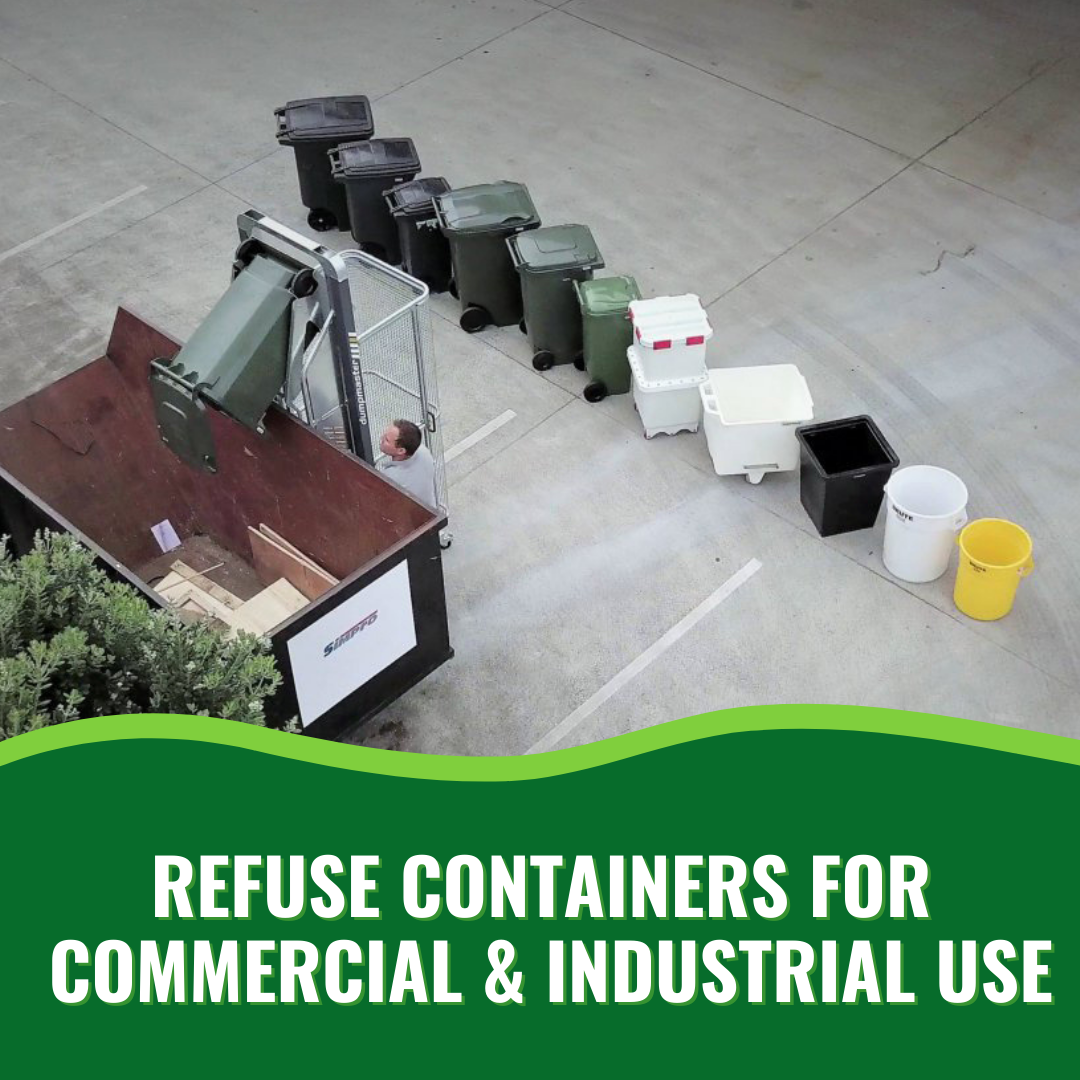We use cookies to make your experience better. To comply with the new e-Privacy directive, we need to ask for your consent to set the cookies. Learn more.
Refuse Containers for Commercial and Industrial Use
Don’t underestimate the importance of high-quality refuse containers (or trash cans, for our American customers). In commercial settings, bins can create a lasting impression on customers; in industrial settings, refuse containers keep the worksite organized and efficient. Durable materials and ergonomic features make a difference, both to the personnel working with the containers and to the operation’s bottom line.

When selecting bins for refuse and recycling, keep these factors in mind:
Size and Weight Capacity - The first (and most obvious) consideration is overall size. Industrial bins are available with capacities ranging from 5 to 290 gallons; larger bin capacities are typically measured in yards.
While size is important, buyers shouldn’t confuse physical capacity with load rating. If a 55-gallon drum can only hold 150 pounds of refuse, it’s not practical for a commercial setting (and certainly not practical for industrial use).
In short, buyers should check that the rated load capacity of the container is appropriate for the intended use. The 1100-liter (1 ½ yard) Mobile Garbage Bin from JCO Plastic features a 970-pound capacity, ideal for managing compost, waste, and recyclables on an industrial site, while the 96-gallon Toter Wheel Cart has an excellent 224-pound load rating.
Durability - In commercial environments, garbage bins experience plenty of abuse. Physical damage from vehicle impacts, chemical exposure, and normal wear-and-tear can quickly add up, and low-quality bins need to be replaced regularly. In other words, they’re ultimately more expensive than high-quality containers made with well-established manufacturing processes.
High-quality containers like the Cascade Icon Series of roll-out carts use materials like injection-molded High Density Polyethylene (HDPE) for resistance against common hazards. Toter Wheel Carts use an Advanced Rotational Molding™ manufacturing process, which is intended to eliminate structural weaknesses found in some HDPE products.
In our experience, both processes provide excellent functionality in challenging environments, though Toter Carts are a more appropriate option when carts are likely to experience regular impacts or heavy use. Both product lines feature replaceable wheels and lids, adding to their long-term durability.
Ergonomics and Maneuverability - Filled refuse bins are heavy — and workers who attempt to move them or empty them without ergonomic equipment take risks. Employers share those risks, since musculoskeletal disorders (MSDs) comprise about 33 percent of all worker injury and illness cases, per OSHA.
To prevent MSDs, employers should look for bins that can be moved with appropriate material handling equipment. All bins should have high-quality, removable casters or wheels, which reduce workers' risks during manual relocation. Most importantly, all bins should be compatible with Bin Dumpers, which allow workers to efficiently empty all types of containers without encountering unnecessary hazards.
Pairing Refuse Containers with Bin Dumpers - All Solus Group refuse containers are compatible with automated and semi-automated Bin Dumpers, though the size of the container and its intended use will play a role in equipment selection.
The Multi-Tip™ Bin Dumper (MTA1800-B) features an adjustable tipping height ranging from 47 to 71 inches and a capacity of up to 330 pounds, ideal for industrial operations, while the 143-pound capacity Ezi-MT manual bin dumper is perfect for small businesses, cafeterias, and other light-duty applications. For more guidance, visit the Solus Group Bin Dumper page or contact our sales team at (314) 696-0200.
Depending on the industry, buyers might consider other factors when purchasing. For instance, for larger operations, features like RFID tags (standard for Cascade Icon Series carts), which allow for easy tracking and improved operational efficiency, particularly when integrated into a larger Industrial Internet of Things (IIoT) system.
Remember, while industrial and commercial refuse containers aren’t exactly exciting, they’re a fundamental part of every well-run operation. By researching them carefully — and by using Bin Dumpers and other appropriate material handling equipment — you can keep your business clean, safe, and productive.
